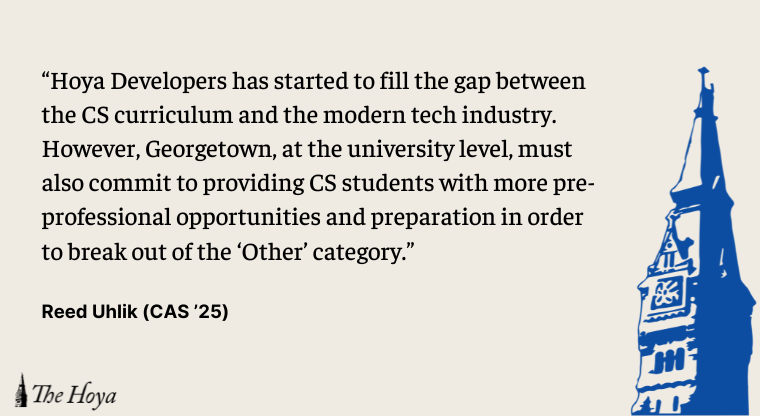The prestige of Georgetown University often offers hope that a degree will open exclusive doors to lucrative careers. Yet, unlike other students in fields such as consulting, finance and foreign policy, computer science (CS) students at Georgetown don’t reap the same benefit of the university’s prestigious name throughout the recruiting process for professional careers in technology.
When applying to top technology internships, applications typically include a dropdown box to select your college. The options listed are 15 to 20 of the country’s top-ranked schools for computer science and, finally, a humbling “Other.”
Georgetown and its students strive to be exceptional, yet we puzzlingly often end up in the “Other” category for CS.
To break out of this “Other” category, Georgetown must reform its CS curriculum to focus more on modern tools and technologies commonly used in the industry that would be recognized by top technology companies.
Often, students point to two factors limiting our CS program — department size and university focus. Our CS program is small, with approximately 34 computer science majors per grade compared to nearly 300 international relations students or 150 finance students, according to College Raptor.
When used effectively, there is a unique advantage that smaller departments can offer. Unlike at larger institutions, students can receive individual attention and mentorship from faculty.
Georgetown primarily receives praise for its achievements in the humanities and business. Despite this, I don’t believe that Georgetown’s CS program cannot be excellent simply because Georgetown is primarily a humanities-oriented school.
In technology, the ability to think critically and the ability to solve challenging problems are two of the most sought-after skills.
Our university attracts and produces some of the brightest minds in the country, but when it comes to landing lucrative software engineering jobs, the problem is not Georgetown students’ ability to learn complex ideas at a rigorous university.
Rather, the issue arises from a lack of relevant experience in building software with industry-standard technologies. Any computer science student will tell you that the most effective way to learn to code is by actually coding.
However, only having experience coding small, individual projects in C++ for a class is not attractive to companies hiring for technical roles. I spoke with a recruiter for a prominent technology company this summer, and his comments confirmed what I suspected: Georgetown students are incredibly smart, but wildly underprepared. While we’re taught important theory and foundational CS concepts, we largely lack the structured experience of applying these concepts to new, modern problems.
These companies want to hire students who not only understand fundamental computer science concepts, but also have real-world experience solving new problems, collaborating on larger projects and developing applications with modern technologies.
This is not to say that the heavy theoretical focus and individualism of the CS major is not valuable. However, this curriculum alone fails at setting students up for success in the rapidly evolving, collaborative technology industry.
Students have had to take on the task of filling this gap.
I, for one, helped to establish Hoya Developers, a software development club that works to complement the academic CS curriculum with much-needed opportunities for students to gain experience working on collaborative projects. Placed on teams of six to eight students, our members are immersed in an internship-like environment, working with their classmates to build websites and mobile applications for real-world clients.
Many top technology companies expect student interns to already have experience with the very tools and skills they promise to offer through their internship program. Because of this, it has historically been difficult for Georgetown students — especially first-years and sophomores who are not exposed to some critical CS skills in their coursework — to secure notable internships.
Hoya Developers aims to change that.
The success of Hoya Developers proves that there’s a strong desire among our CS students to collaborate on building projects and to pursue technical careers. When applying to internships and jobs, members now have real-world technical projects to showcase. We are equipped with the modern technical knowledge that companies actually value. And beyond the pre-professional realm, we have a newfound ability to harness the collective creativity and ingenuity of our student body to build exceptional products.
Hoya Developers has started to fill the gap between the CS curriculum and the modern tech industry. However, Georgetown, at the university level, must also commit to providing CS students with more pre-professional opportunities and preparation in order to break out of the “Other” category.
CS students deserve to finally reap the benefit of the Georgetown name, and the university is responsible for following the path laid by Hoya Developers to tailor the CS program to best enable students to succeed in the tech industry.
Reed Uhlik is a junior in the College of Arts & Sciences.














